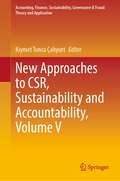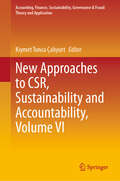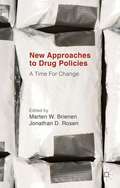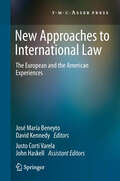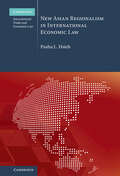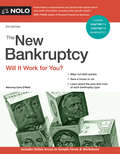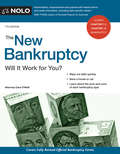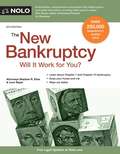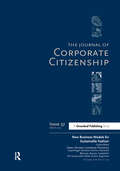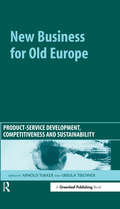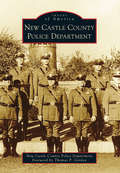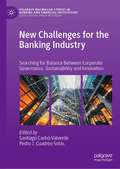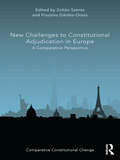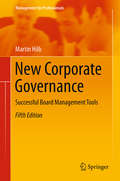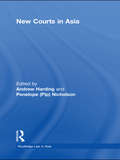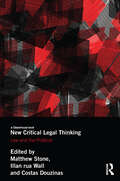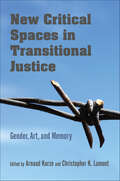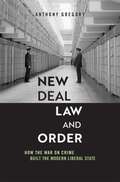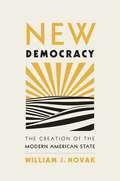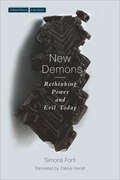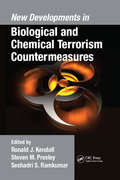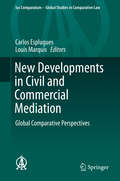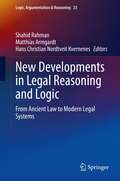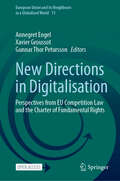- Table View
- List View
New Approaches to CSR, Sustainability and Accountability, Volume V (Accounting, Finance, Sustainability, Governance & Fraud: Theory and Application)
by Kıymet Tunca ÇalıyurtThis book continues the discussion from the first four volumes on the challenges that organizations face in order to implement sustainability, ethics, and effective corporate governance, all of which are important elements of “standing out” from other companies. Examining the background of the New European Consensus on development with the new guiding motto ‘Our World, Our Dignity, Our Future,’ the authors explore how this new legislation on sustainability issues around the world is forcing companies to deal directly with sustainability issues. The 2030 Agenda for Sustainable Development (2030 Agenda), adopted by the United Nations in September 2015, is the international community’s response to global challenges and trends in connection with sustainable development. With the Sustainable Development Goals (SDGs) at its core, the 2030 Agenda is a transformative political framework designed to eradicate poverty and achieve sustainable development globally. It balances the economic, social, and environmental dimensions of sustainable development, including the key issues of governance and peaceful and inclusive societies, and recognizes the essential interlinkages between its goals and targets, i.e., that they must be implemented as a whole and not selectively. The respective chapters in this volume raise a number of questions regarding corporate social responsibility, ethics, and corporate governance in the face of new technology and new approaches to climate change and sustainability reporting.
New Approaches to CSR, Sustainability and Accountability, Volume VI (Accounting, Finance, Sustainability, Governance & Fraud: Theory and Application)
by Kıymet Tunca ÇalıyurtThis book continues the discussion from the first five volumes on the challenges that organizations face in order to implement sustainability, ethics, and effective corporate governance, all of which are important elements of &“standing out&” from other companies. Examining the background of the New European Consensus on development with the new guiding motto &‘Our World, Our Dignity, Our Future,&’ the authors explore how this new legislation on sustainability issues around the world is forcing companies to deal directly with sustainability issues.
New Approaches to Drug Policies: A Time for Change
by Marten W. Brienen Jonathan D. RosenThe U. S. -led war on drugs has failed: drugs remain purer, cheaper and more readily available than when the war on drugs began in 1971. The drug war also has resulted in extreme levels of violence as drug traffickers and organized criminals compete for control of territory. Prohibitionist policies have destroyed the lives of millions of people as prisons warehouse drug offenders. This important volume represents an effort to map new approaches to drug policies. The contributors write from various disciplinary backgrounds and provide crucial insights on a wide-range of topics, including the gang-drug nexus, delinquency, legalization, trafficking, decriminalization, intervention programs and prison reform. This volume also provides a number of policy solutions and alternatives to the current drug strategies. Includes contributions from: Marten W. Brienen, Ted Galen Carpenter, Roger G. Dunham, Gregory Fulkerson, Betty Horwitz, Caitlin Elizabeth Hughes, Hanna Samir Kassab, Ana Maria Lobos, Bradford R. McGuinn, Fida Mohammad, Keri O'Neal, J. Bryan Page, Susan A. Phillips, Vanessa Rayan, Jonathan D. Rosen, Alex Stevens, Steven L. West, and Marcelo Rocha e Silva Zorovich.
New Approaches to International Law
by David Kennedy John Haskell José María Beneyto Justo Corti VarelaThis volume offers a unique reflection on the historic and contemporary influence of the New Approaches to International Law (NAIL) movement within the context of Europe and America. In particular, the contributions focus on the intellectual product of NAIL's founder, David Kennedy, in relation to three legal streams: human rights, legal history, and the law of war. On the one hand, the volume is valuable reading for a broad audience interested in the current challenges facing global governance, and how critical studies might contribute to innovative intellectual and practice-oriented developments in international law. On the other hand, stemming from a 2010 seminar in Madrid that brought together scholars to discuss David Kennedy's scholarship over the last three decades, the contributions here are a testament to the community and ideas of the NAIL tradition. The volume includes scholars from a wide field of legal interests and backgrounds.
New Asian Regionalism in International Economic Law (Cambridge International Trade and Economic Law)
by Pasha L. HsiehThis book provides the first systematic analysis of new Asian regionalism as a paradigm shift in international economic law. It argues that new Asian regionalism has emerged amid the Third Regionalism and contributed to the New Regional Economic Order, which reinvigorates the role of developing countries in shaping international trade norms. To substantiate the claims, the book introduces theoretical debates and evaluates major regional economic initiatives and institutions, including the ASEAN+6 framework, APEC, the CPTPP and the RCEP. It also sheds light on legal issues involving the US-China trade war and the COVID-19 pandemic, as well as trade policies of Asian powers, the European Union and the United States. Hence, the legal analysis and case studies offer a fresh perspective of Asian integration and bridge the gap between academia and practice.
New Bankruptcy, The: Will It Work for You?
by Cara O'NeillNot sure where to start? Let’s find the right bankruptcy option for you. You know bankruptcy will help you get back on your financial feet. But which chapter type is best? The New Bankruptcy explains the benefits of Chapter 7 and Chapter 13 bankruptcy. You’ll learn that Chapter 7 bankruptcy will: Not sure where to start? Let’s find the right bankruptcy option for you. wipe out credit card balances, utility bills, and more protect property you need to work and live, and take about four to six months to complete. Chapter 13 bankruptcy works by keeping creditors at bay while you: catch up on a house or car payment pay off an overdue tax or support balance, and pay less on other debt, such as credit cards and student loans. The 8th edition’s expanded online companion page includes downloadable worksheets and easy-to-use charts, as well as a sample bankruptcy filing on the latest official legal forms.
New Bankruptcy, The: Will It Work for You?
by Stephen Elias Leon BayerChoose the best bankruptcy option The New Bankruptcy provides clear-cut information, answers to common questions, worksheets, and strategies to help you figure out whether bankruptcy is the right solution to your debt problem. Find out: the main differences between Chapter 7 and Chapter 13 bankruptcy whether you qualify for Chapter 7 bankruptcy (the means test) how the Chapter 13 repayment plan works which type of bankruptcy (7 or 13) is better in various situations which debts are wiped out what happens to your property, including your home, car, and retirement accounts, and other ways to handle debt problems. The book also outlines the bankruptcy process and includes completed sample bankruptcy forms.
New Bankruptcy,The
by Stephen Elias Leon BayerConsidering bankruptcy? Get the facts and find out how bankruptcy could work for you. Bankruptcy laws have changed, and figuring out how to use them effectively is harder than ever. For plain-English guidance you can trust, turn to The New Bankruptcy. Get the strategies, clear-cut answers, and information and you need to figure out whether bankruptcy is the right solution for your debt problems. Find out: -if you qualify for Chapter 7 bankruptcy -how Chapter 13 repayment plans work -which debts are wiped out -how bankruptcy affects homeowners -if you can keep cars and other property -how bankruptcy affects credit -alternative ways to handle debt problems This edition includes updated state and federal exemption tables, plus information on recent Supreme Court cases used to interpret 2005 bankruptcy changes. You'll also get worksheets to help you determine whether you can file for bankruptcy, including fully up-to-date exemption charts, helpful checklists, and easy-to-use legal charts for all 50 states.
New Battlefields/Old Laws: Critical Debates on Asymmetric Warfare (Columbia Studies in Terrorism and Irregular Warfare)
by William BanksAn internationally-recognized authority on constitutional law, national security law, and counterterrorism, William C. Banks believes changing patterns of global conflict are forcing a reexamination of the traditional laws of war. The Hague Rules, the customary laws of war, and the post-1949 law of armed conflict no longer account for nonstate groups waging prolonged campaigns of terrorism—or even more conventional insurgent attacks. Recognizing that many of today's conflicts are low-intensity, asymmetrical wars fought between disparate military forces, Banks's collection analyzes nonstate armed groups and irregular forces (such as terrorist and insurgent groups, paramilitaries, child soldiers, civilians participating in hostilities, and private military firms) and their challenge to international humanitarian law. Both he and his contributors believe gaps in the laws of war leave modern battlefields largely unregulated, and they fear state parties suffer without guidelines for responding to terrorists and their asymmetrical tactics, such as the targeting of civilians. These gaps also embolden weaker, nonstate combatants to exploit forbidden strategies and violate the laws of war. Attuned to the contested nature of post-9/11 security and policy, this collection juxtaposes diverse perspectives on existing laws and their application in contemporary conflict. It sets forth a legal definition of new wars, describes the status of new actors, charts the evolution of the twenty-first-century battlefield, and balances humanitarian priorities with military necessity. While the contributors contest each other, they ultimately reestablish the legitimacy of a long-standing legal corpus, and they rehumanize an environment in which the most vulnerable targets, civilian populations, are themselves becoming weapons against conventional power.
New Business Models for Sustainable Fashion: A Special Theme Issue of The Journal of Corporate Citizenship (Issue 57)
by Miguel Angel Gardetti Esben Rahbek Gjerdrum PedersenThe fashion industry has not traditionally been associated with definitions of sustainable development and sustainability. The social and environmental challenges faced by the fashion industry concern the entire supply and demand chain, propped up by a throwaway consumer culture.In response to these sustainability challenges, some fashion companies have developed innovative social and environmental initiatives. While many of these initiatives are sympathetic, resourceful and hold real potential for generating social and environmental improvements, greater scale and scope is needed in order to bring about a more fundamental shift in current practices.This Special Issue of the Journal of Corporate Citizenship explores how sustainability can be a driver for exploring new business models within a single industrial setting, highlighting some of the sustainability initiatives that bring hope for a more sustainable future. New Business Models for Sustainable Fashion is a must-read for researchers and practitioners tackling the challenges of an industry in need of large-scale transformation.
New Business for Old Europe: Product-Service Development, Competitiveness and Sustainability
by Ursula Tischner Arnold TukkerSelling products used to be the standard way of doing business. Traditionally, it is left to the user to transform the purchase of a product into something that fulfils effectively a final-user need. Today, two streams of research – business management and sustainability – normally with very distinct perspectives on the world, have surprisingly converged to form a common conclusion: selling products is old-fashioned business. Companies should switch their focus to selling need fulfilment, satisfaction, or experiences. Or, in other words, selling integrated solutions or product-services. The business management literature argues that, by focusing on the integrated, final-client needs, and delivering integrated solutions fulfilling these needs, companies will be able to improve their position in the value chain, enhance added value of their offering, and improve their innovation potential. In a business world where many products are becoming equally well-performing commodities, this strategy is one of the ways to avoid a sheer competition on price – a type of competition that Europe never can win with emerging and low-cost economies such as China. In that sense, product-services can mean new business for old Europe. The sustainability knowledge stream argues that need-focused solutions could be inherently more sustainable than products. Product-services could offer the value of use instead of the product itself and decrease the environmental load in two ways. First, companies offering the service would have all the incentives to make the (product-)system efficient, as they get paid by the result. Second, consumers would be encouraged to alter their behaviour as they gain insight into all the costs involved with the use. Until today, the connections and interchange between the two research streams have been quite limited. The question of whether product-services truly are the avenue to a sustainable world is still under discussion. This book aims to develop a systematic view on this issue. The potential of product-services to enhance competitiveness and contribute to sustainable development prompted the EU to invest heavily in the theme under the EU's 5th Framework Programme (FP5; 1997-2002). A variety of research and development projects in the field were supported under the umbrella of the Sustainable Product Development Network (SusProNet). These included MEPSS (Methodology Product Service Systems); Home Services; HiCS (Highly Customerised Solutions); Prosecco (Product-Service Co-design); and Innopse (Innovation Studio and exemplary developments for Product-Service). The projects were undertaken by a mix of European research institutions and companies including Orange, Philips and Nokia. Some of these projects focused on developing methods that could help industries change their output from a product to a service. Others focused on the development of new product-services or solutions (HiCS, Prosecco, Innopse), and yet others tried to analyze under which circumstances product-services are likely to be implemented and accepted by consumers (Home Services). One project focused on dissemination of the concept to SMEs (Lean Services). Other projects focused purely on new product-service development, such as Brainfridge (an intelligent fridge managing its supply chain), ASP-NET (application service providers), Protex (intelligent enzymes) and IPSCON (receivers for wireless telephones). New Business for Old Europe brings together the key outputs from all of these groups to present a state-of-the-art collection on product-service development, prospects and implications for competitiveness and sustainability. The book has a number of aims. First, it attempts to bridge the gap between business and sustainability literature to lead to a better-founded understanding of the business drivers for embarking on product-service development, and its relation with sustainability and competitiveness. Second, the book reviews the large amount of studies that h
New Castle County Police Department (Images of America)
by New Castle County Police Department Thomas P. GordonThe New Castle County Police Department has provided over a century of service to a county that continues to grow. In February 1913, two men were duly appointed and became the driving force of the New Castle County Rural Police. By the early 1930s, this small team evolved into an efficient police force. Today, the department has grown to be one of the top law enforcement agencies in the country and is comprised of approximately 350 law enforcement officers. Members of the New Castle County Police Department have displayed tremendous courage and sacrifice in the line of duty. The dedicated men and women of the force continue to provide a positive and invaluable service to the diverse communities of New Castle County.
New Challenges for the Banking Industry: Searching for Balance Between Corporate Governance, Sustainability and Innovation (Palgrave Macmillan Studies in Banking and Financial Institutions)
by Santiago Carbó-Valverde Pedro J. Cuadros-SolasThis book aims to enrich the banking and finance literature by gathering insights in new research topics being undertaken in the aftermath of the Covid-19 pandemic. The book spans all the major research fields in finance and banking with a particular focus on corporate governance, sustainability and innovation. The book brings together academics at a range of European universities and stems from research presented at the 2022 Annual Conference of the Wolpertinger Club. The first part focuses on the impact of banks’ corporate governance practice on their performance, including pay gaps as well as diversity and ESG policies. The second part examines how banks are conducting their green transition with topics including reputational risk, greenwashing, green bonds, and ESG scores. The final section of the book considers the role of digitalization and innovative technologies in creating unprecedented disruption in the banking sector. This edited collection is valuable to those researching in finance, banking and business, as well as policymakers and operational decision makers at financial institutions.
New Challenges to Constitutional Adjudication in Europe: A Comparative Perspective (Comparative Constitutional Change)
by Zoltán Szente Fruzsina Gárdos-OroszIn the past few years, constitutional courts have been presented with new challenges. The world financial crisis, the new wave of terrorism, mass migration and other country-specific problems have had wide-ranging effects on the old and embedded constitutional standards and judicial constructions. This book examines how, if at all, these unprecedented social, economic and political problems have affected constitutional review in Europe. As the courts’ response must conform with EU law and in some cases international law, analysis extends to the related jurisprudence of the European Court of Justice and the European Court of Human Rights. The collection adopts a common analytical structure to examine how the relevant challenges have been addressed in ten country specific case studies. Alongside these, constitutional experts frame the research within the theoretical understanding of the constitutional difficulties of the day in Europe. Finally, a comparative chapter examines the effects of multilevel constitutionalism and identifies general European trends. This book will be essential reading for academics and researchers working in the areas of constitutional law, comparative law and jurisprudence.
New Corporate Governance
by Martin HilbIn the 5th edition of this successful book Martin Hilb presents an innovative and integrated approach to the theory and practice of corporate governance. Central to this approach is a set of instruments - developed and tested by the author - that can be used by boards to offer effective strategic direction and control to their organizations. The board instruments can be readily applied to the selection, review, remuneration and development of board members, and for conducting board self-evaluations. This new approach to corporate governance is based on four guiding principles: keep it situational, keep it strategic, keep it integrated, and keep it controlled. Together, these principles form the basis of an integrated approach to all key aspects of corporate governance. The main arguments in each section are supported by conceptual models, practical board tools and case studies, making the book ideally suited to board members, senior managers and post-graduate students. This new edition is updated throughout the book and includes a new chapter on mobile integrated board management and documentation information systems.
New Courts in Asia (Routledge Law in Asia)
by Andrew HardingThis book discusses court-oriented legal reforms across Asia with a focus on the creation of ‘new courts’ over the last 20 years. Contributors discuss how to judge new courts and examine whether the many new courts introduced over this period in Asia have succeeded or failed. The ‘new courts’ under scrutiny are mainly specialist courts, including those established to hear cases involving intellectual property disputes, bankruptcy petitions, commercial contracts, public law adjudication, personal law issues and industrial disputes. The justification of the trend to ‘judicialize’ disputes has seen the invocation of Western-style rule of law as necessary for the development of the market economy, democratization, good governance and the upholding of human rights. This book also includes critics of court building who allege that it serves a Western agenda rather than serving local interests, and that the emphasis on judicialization marginalises alternative local and traditional modes of dispute resolution. Adopting an explicitly comparative perspective, and contrasting the experiences of important Asian states - China, Japan, Korea, Malaysia, Vietnam, Brunei, Thailand and Indonesia - this book considers critical questions including: Why has the ‘new-court model’ been adopted, and why do international development agencies and nation-states tend to favour it? What difficulties have the new courts encountered? How have the new courts performed? What are the broader implications of the trend towards the adoption of judicial solutions to economic, social and political problems? Written by world authorities on court development in Asia, this book will not only be of interest to legal scholars and practitioners, but also to development specialists, economists and political scientists.
New Critical Legal Thinking: Law and the Political (Birkbeck Law Press)
by Costas Douzinas Matthew Stone Illan Rua WallNew Critical Legal Thinking articulates the emergence of a stream of critical legal theory which is directly concerned with the relation between law and the political. The early critical legal studies claim that all law is politics is displaced with a different and more nuanced theoretical arsenal. Combining grand theory with a concern for grounded political interventions, the various contributors to this book draw on political theorists and continental philosophers in order to engage with current legal problematics, such as the recent global economic crisis, the Arab spring and the emergence of biopolitics. The contributions instantiate the claim that a new and radical political legal scholarship has come into being: one which critically interrogates and intervenes in the contemporary relationship between law and power.
New Critical Spaces in Transitional Justice: Gender, Art, and Memory
by Edited by Arnaud Kurze and Christopher K. LamontSince the 1980s, transitional justice mechanisms have been increasingly applied to account for mass atrocities and grave human rights violations throughout the world. Over time, post-conflict justice practices have expanded across continents and state borders and have fueled the creation of new ideas that go beyond traditional notions of amnesty, retribution, and reconciliation. Gathering work from contributors in international law, political science, sociology, and history, New Critical Spaces in Transitional Justice addresses issues of space and time in transitional justice studies. It explains new trends in responses to post-conflict and post-authoritarian nations and offers original empirical research to help define the field for the future.
New Deal Law and Order: How the War on Crime Built the Modern Liberal State
by Anthony GregoryA historian traces the origins of the modern law-and-order state to a surprising source: the liberal policies of the New Deal.Most Americans remember the New Deal as the crucible of modern liberalism. But while it is most closely associated with Roosevelt’s efforts to end the Depression and provide social security for the elderly, we have failed to acknowledge one of its most enduring legacies: its war on crime. Crime policy, Anthony Gregory argues, was a defining feature of the New Deal. Tough-on-crime policies provided both the philosophical underpinnings and the institutional legitimacy necessary to remake the American state.New Deal Law and Order follows President Franklin Roosevelt, Attorney General Homer Cummings, and their war on crime coalition, which overcame the institutional and political challenges to the legitimacy of national law enforcement. Promises of law and order helped to manage tensions among key Democratic Party factions—organized labor, Black Americans, and white Southerners. Their anticrime program, featuring a strengthened criminal code, an empowered FBI, and the first federal war on marijuana, was essential to the expansion of national authority previously stymied on constitutional grounds. This nascent carceral liberalism both accommodated a redoubled emphasis on rehabilitation and underwrote a massive wave of prison construction across the country. Alcatraz, an unforgiving punitive model, was designed to be a “symbol of the triumph of law and order.” This emergent security state eventually transformed both liberalism and federalism, and in the process reoriented the terms of US political debate for decades to come.
New Democracy: The Creation of the Modern American State
by William J. NovakThe activist state of the New Deal started forming decades before the FDR administration, demonstrating the deep roots of energetic government in America. In the period between the Civil War and the New Deal, American governance was transformed, with momentous implications for social and economic life. A series of legal reforms gradually brought an end to nineteenth-century traditions of local self-government and associative citizenship, replacing them with positive statecraft: governmental activism intended to change how Americans lived and worked through legislation, regulation, and public administration. The last time American public life had been so thoroughly altered was in the late eighteenth century, at the founding and in the years immediately following. William J. Novak shows how Americans translated new conceptions of citizenship, social welfare, and economic democracy into demands for law and policy that delivered public services and vindicated people’s rights. Over the course of decades, Americans progressively discarded earlier understandings of the reach and responsibilities of government and embraced the idea that legislators and administrators in Washington could tackle economic regulation and social-welfare problems. As citizens witnessed the successes of an energetic, interventionist state, they demanded more of the same, calling on politicians and civil servants to address unfair competition and labor exploitation, form public utilities, and reform police power. Arguing against the myth that America was a weak state until the New Deal, New Democracy traces a steadily aggrandizing authority well before the Roosevelt years. The United States was flexing power domestically and intervening on behalf of redistributive goals for far longer than is commonly recognized, putting the lie to libertarian claims that the New Deal was an aberration in American history.
New Demons: Rethinking Power and Evil Today (Cultural Memory in the Present)
by Simona Forti translated by Zakiya HanafiAs long as we care about suffering in the world, says political philosopher Simona Forti, we are compelled to inquire into the question of evil. But is the concept of evil still useful in a postmodern landscape where absolute values have been leveled and relativized by a historicist perspective? Given our current unwillingness to judge others, what signposts remain to guide our ethical behavior? Surveying the nineteenth- and twentieth-century Western philosophical debates on evil, Forti concludes that it is time to leave behind what she calls "the Dostoevsky paradigm": the dualistic vision of an omnipotent monster pitted against absolute, helpless victims. No longer capable of grasping the normalization of evil in today's world-whose structures of power have been transformed-this paradigm has exhausted its explanatory force. In its place, Forti offers a different genealogy of the relationship between evil and power, one that finally calls into question power's recurrent link to transgression. At the center of contemporary evil she posits the passive attitude towards rule-following, the need for normalcy, and the desire for obedience nurtured by our contemporary mass democracies. In our times, she contends, evil must be explored in tandem with our stubborn desire to stay alive at all costs as much as with our deep need for recognition: the new modern absolutes. A courageous book, New Demons extends an original, inspiring call to ethical living in a biopolitical age.
New Developments in Biological and Chemical Terrorism Countermeasures
by Ronald J. Kendall; Steven M. Presley; Seshadri S. RamkumarA science-based text, New Developments in Biological and Chemical Terrorism Countermeasures presents research that addresses the growing threat of chemical and biological terrorism as well as the need for improvements in the implementation of countermeasures. This new textbook building upon Advances in Biological and Chemical Terrorism Countermeasu
New Developments in Civil and Commercial Mediation
by Carlos Esplugues Louis MarquisBy means of the analysis of more than 20 national jurisdictions of different legal and geographical origin this book provides a general understanding of the developments that civil and commercial mediation is currently undertaking across the world. The book combines 25 national reports with a General Report analyzing the major trends in civil and commercial mediation worldwide. A number of the key variables that make mediation so effective are studied in depth in the book. The concept of mediation, that varies from country to country. Its legal framework and the branches of public and private law in which it is used. The legal condition of the mediation agreement and its relevant conditions of form and content, the responsibilities of the parties in the event that they violate this agreement and the effects of this agreement on potential recourse to the courts or to arbitration, as well as with regard to pending cases. As well as the role played by the mediator, his or her appointment or designation, legal and ethical responsibilities, and the role of institutions in mediation. As well as the mediation process, its applicable rules and principles and its costs are analyzed on comparative basis. The book also pays special attention to the outcome of mediation. The enforceability of the settlement reached both in domestic and cross-border mediations constitutes a basic element for the success of the institution and is thoroughly studied. This volume constitutes a unique instrument for those interested on mediation, either practitioners, judges or academics.
New Developments in Legal Reasoning and Logic: From Ancient Law to Modern Legal Systems (Logic, Argumentation & Reasoning #23)
by Shahid Rahman Matthias Armgardt Hans Christian Nordtveit KvernenesThis book intends to unite studies in different fields related to the development of the relations between logic, law and legal reasoning. Combining historical and philosophical studies on legal reasoning in Civil and Common Law, and on the often neglected Arabic and Talmudic traditions of jurisprudence, this project unites these areas with recent technical developments in computer science. This combination has resulted in renewed interest in deontic logic and logic of norms that stems from the interaction between artificial intelligence and law and their applications to these areas of logic. The book also aims to motivate and launch a more intense interaction between the historical and philosophical work of Arabic, Talmudic and European jurisprudence. The publication discusses new insights in the interaction between logic and law, and more precisely the study of different answers to the question: what role does logic play in legal reasoning? Varying perspectives include that of foundational studies (such as logical principles and frameworks) to applications, and historical perspectives.
New Directions in Digitalisation: Perspectives from EU Competition Law and the Charter of Fundamental Rights (European Union and its Neighbours in a Globalized World #13)
by Annegret Engel Xavier Groussot Gunnar Thor PeturssonThis open access book brings together experts from both EU competition law as well fundamental rights backgrounds, discussing the most recent developments in EU legislation on digitalisation. Most prominently, it explores the recently introduced Digital Markets Act (DMA), including a discussion on other related legislative acts and the respective case law. It is aimed mostly at academics and researchers in the area of digitalisation, EU competition law, and the EU Charter, but will also provide some useful insights from practitioners in the field. The internet has long been neglected and exempt from being regulated at EU level. In particular, this concerns the application of fundamental rights. The specific challenges for the digital sphere are numerous; worldwide scope, easy access, interoperability, rapid technological change, fluctuating market conditions, anonymity, disinformation, lack of traceability and thus enforcement, to name but a few. Fundamental EU values, in particular including democracy and the respect for human rights, have suffered as a direct result of these growing problems in the digital sphere. More recently, however, the EU has started to actively regulate the new technologies in order to avoid European values being undermined by an unregulated internet. In the specific field of competition law, the development of new technologies has created many challenges and raised questions for the legislator how to regulate big market players: their cross-border nature, vicissitudes, and enormous market powers allow some of them to be able to escape legal scrutiny under the current set of ex-post rules. The DMA now introduces an ex-ante mechanism for competition law and claims to be aligned with the procedural and institutional rights granted under the Charter, which will be scrutinised and challenged by the various contributions in this book.
